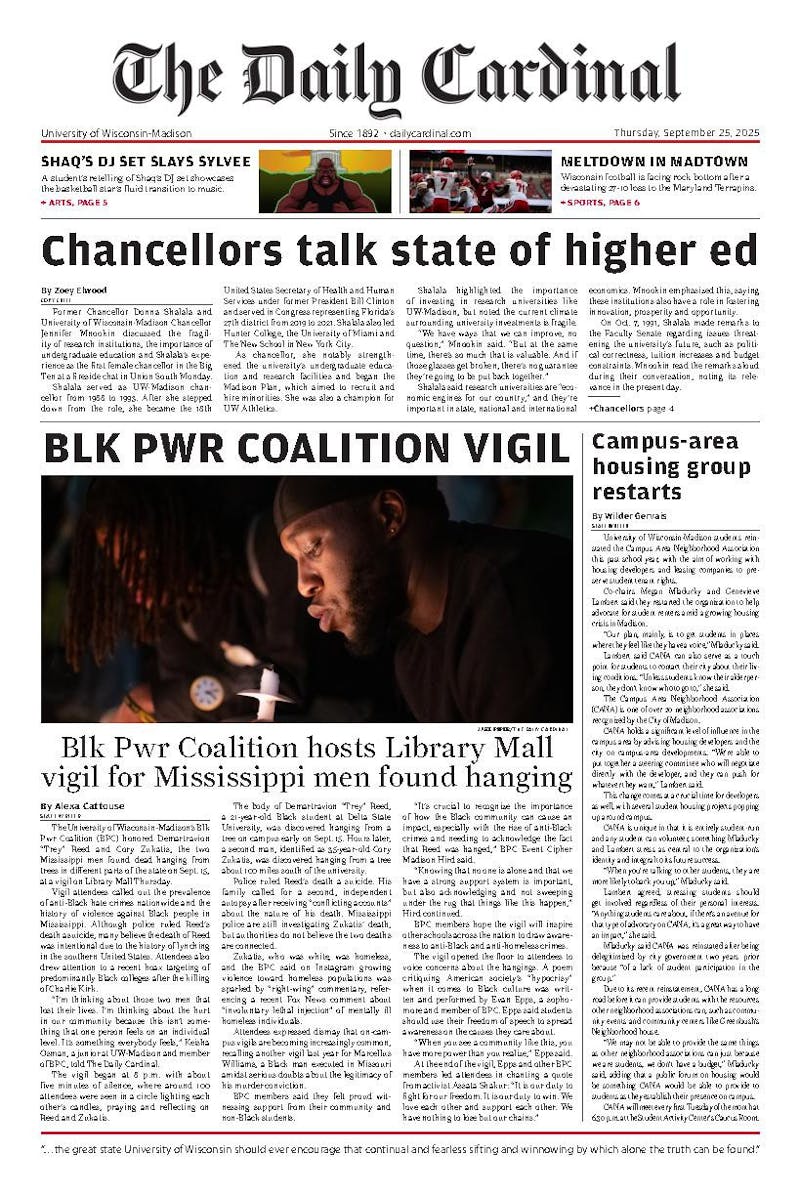A ""noticeable spike"" in downtown crime in the first half of 2006 led city officials to push for a separate fund for downtown safety programs. In February, the City Council passed the Downtown Safety Initiative—$100,000 set aside for the Madison Police Department's central district.
Mayor Dave Cieslewicz said the initiative will ""not put an end to all crime,"" but is a step in the right direction.
""The three goals that it focuses on—[to] reduce violence downtown, enhance community policing and improve compliance with alcohol-related laws—will help make downtown and campus neighborhoods safer for residents, businesses and visitors alike,"" Cieslewicz said.
City officials designated the money specifically for downtown safety because of recent increases in street-level crime and alcohol-related violence. Mayor spokesperson George Twigg said in the first six months of 2006, city officials noticed an increase in downtown crime.
""The first half of 2006 saw a noticeable spike in some downtown crime issues, especially robberies,"" Twigg said. ""What the mayor wanted to do was get ahead of the curve to prevent problems, not just respond to them.""
The police want a plan in place as soon as possible to establish a baseline for what was going on in the community in terms of crime, Cieslewicz said. He said the police put the initiative in place to gain an understanding of the downtown community's perception of public safety.
""It was important to me that the police department go out and listen carefully to campus concerns regarding safety issues downtown,"" Cieslewicz said. ""I think the plan that was developed reflects many of those concerns, especially in the area of additional resources for neighborhood watch programs.""
Ald. Mike Verveer, District 4, said a string of muggings and assaults in 2006, combined with the numerous problems on King Street prompted the city to take action. He said downtown is such a vital area that the mounting problems could no longer be overlooked.
""Downtown belongs to all of us,"" Verveer said. ""[It] is such an integral part of our community that if there are problems in the downtown core, they really seem to have a ripple effect throughout the community.""
Approximately $75,000 of the $100,000 will go toward officer overtime that will allow for increased police presence on weekend nights, especially in areas with a high density of bars, such as State Street and the surrounding student neighborhoods.
MPD Central District Commander Capt. Mary Schauf said the money would be used for patrolling city streets. She noted that while it is not the responsibility of the city police to patrol campus streets, the city works closely with UW police to keep students safe.
""We have a good relationship with [UW police]. We share information with them regularly and our officers actually work together ... if there are areas of joint interest. For instance, some of the community officers from UW police will come out and walk with our Langdon Street officer,"" she said.
Twigg said that the UW campus is a large part of the downtown area that will be getting these additional resources.
""The police officers, especially on Langdon Street, have a pretty good neighborhood watch program,"" he said, adding that the city wants to implement similar programs elsewhere.
Ald. Austin King, District 8, said the city has always been concerned with community safety, but this marks the first time money was set aside in a special fund for issues specific to the downtown area.
Schauf said that although $100,000 is a small amount compared to the entire police budget of $70 million, it would make a large difference in terms of what the police can do on a local level.
""This $100,000 gives me the ability to say phones for community officers are a priority for us ... it gives us money to fund some of the things that would go unfunded,"" Schauf said.
Under the initiative, each neighborhood within the Central District, including many student neighborhoods such as College Court and the Langdon Street corridor, now has its own community officer. Each officer is equipped with a cell phone that residents can call with non-emergency questions and concerns.
Not all student neighborhoods will be included in the safety initiative, however, because they are not located within central district boundaries. According to Madison police, streets predominately east of Park Street running to Capitol Square will get the bulk of the attention.
Despite the boundaries excluding the west half of campus, Schauf stressed the importance of community involvement and has continually encouraged downtown residents to attend community safety meetings.
""If we provide the opportunity for people to talk to us, we may get valuable insights into what they are saying and what their concerns are and that will help us be more proactive,"" she said.
Ald. Robbie Webber, District 5, also said Madison residents and students need get involved and take responsibility for crime reduction.
""We are the social environment and ... if we want to change something we have to take responsibility for it, as well as making sure there is police backup, because obviously there will be times when police are needed. But as a society we can cut back on the times when police are needed by looking out for each other,"" she said.





